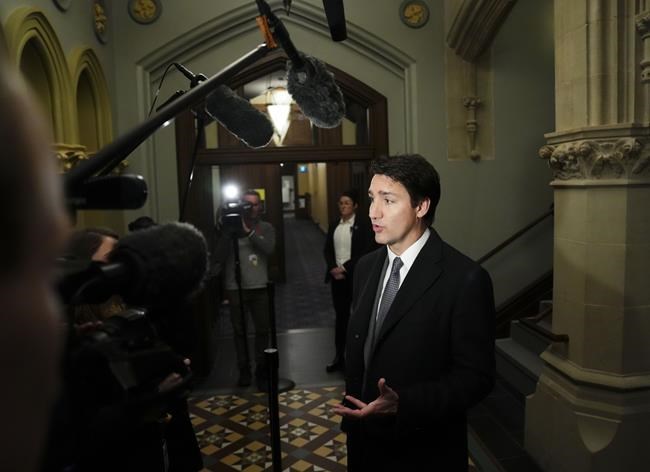OTTAWA — Prime Minister Justin Trudeau says everyone in China should be allowed to express themselves amid Beijing's crackdown on COVID-19. He also says an Ottawa university should not have barred reporters from filming China's ambassador this week.
Crowds in China angered by the anti-virus controls have called on leader Xi Jinping to resign in the biggest show of public dissent in decades. The regime has eased some of its strict controls after demonstrations in at least eight mainland cities as well as Hong Kong.
But authorities have shown no sign of backing off their larger “zero-COVID” strategy that has confined millions of people to their homes for months at a time.
Security forces have detained an unknown number of people and stepped up surveillance, arresting a BBC journalist.
Trudeau said it's crucial that protesters be allowed to speak up.
"Canadians are watching very closely. Obviously everyone in China should be allowed to express themselves (and) should be allowed to share their perspectives, and indeed protest," he said.
"We're going to continue to ensure that China knows we’ll stand up for human rights. We’ll stand with people who are expressing themselves. We also need to make sure that China, and places around the world, are respecting journalists and their ability to do their job."
His comments come just after weeks of testimony over Trudeau's invocation of the Emergencies Act to clear out-of-hand protests in Canada last winter, which ranged from discontent over vaccine requirements to rage fuelled by conspiracy theories.
On Monday, Chinese ambassador Cong Peiwu defended his country's handling of protests following a speech to University of Ottawa students, some of whom questioned Beijing's actions.
"In China, the policy works well," Cong said, adding that Beijing has loosened COVID-19 restrictions as scientific knowledge evolves.
"The central government in China, our philosophy is putting people first, putting life first."
The focus of Cong's speech was different models of governance, and he insisted that China governs through a growing number of online consultation platforms, in addition to elections and responding to protests.
"Officials at different levels also read news very carefully, to see if there is anything wrong with their day-to-day operations."
China does not have a free press, stifles demonstrations and censors the internet on numerous issues.
During Cong's Monday remarks, a blind was lowered over a window to block the view of a campus protest against China's treatment of Uyghurs.
Journalists were allowed to attend Cong's speech but forbidden from filming, which the prime minister disapproved of Tuesday.
"I don't know all the details of the incident, but for me they made a mistake in banning the cameras," Trudeau told reporters in French.
"In Canada we open (things) especially to people who have a public profile. The media must have access."
The university said the event was primarily meant for students, and it was caught off guard when Cong asked to prohibit filming.
"The talks are open to members of the public who register, including journalists. A speaker's unexpected refusal to allow cameras jeopardizes the event. However, the university did ensure journalists gained access to the speaking event," wrote University of Ottawa spokesman Jesse Robichaud.
"To ensure that this unfortunate situation doesn’t reoccur, the university will be clearer, in the runup to events, with speakers about the possible presence of broadcast media."
Heritage Minister Pablo Rodriguez, who oversees media funding, said he couldn't get into specifics about the incident.
"Freedom of the press is one of the foundations of democracy and it must take precedence over everything," he said in French.
"I can't speak in general about the university but, as I tell you, our democracy was built on (press freedom)."
This report by The Canadian Press was first published Nov. 29, 2022.
— With files from The Associated Press
Dylan Robertson, The Canadian Press



